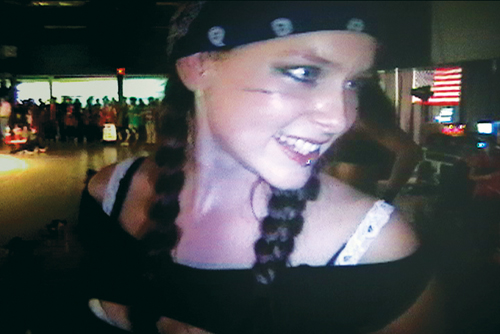“I got a buzz and it felt good, so I got drunk,” says Sharon, a Portland-area teen and recovering addict in one of the more matter-of-fact moments in Janet McIntyre’s 2011 documentary, Faded: Girls + Binge Drinking. “That was it.”

The Northwest Film Center will show Faded this Thursday as a part of its “Northwest Tracking” film series. McIntyre will be in attendance to promote the film, which The Oregonian’s Kelly House called “heartbreaking, disturbing and at times comical.”
McIntyre, who resides in Portland and currently works as the dean of visual and performing arts at Mt. Hood Community College, is an accomplished and award-winning director. Her documentary about American Muslim teenagers, Covered Girls, aired on Showtime, TNT and the Documentary Channel, and her work has appeared at the Telluride Film Festival, the Hot Docs Canadian International Film Festival and the Nashville Film Festival.
Faded follows four young women over the span of two or three years as they grapple with the role alcohol plays in their respective lives.
There’s Cassidy, a literature and theater enthusiast who we see in the year before and after starting college; Alyssa, a Parkrose high schooler who lives in a single-parent household; Sharon, a radiant and grounded Indonesian immigrant who, now sober, must worry about her 13-year-old sister; and Holley, a bartender and roller derby girl whose binge drinking is slowly damaging her personal and professional life.
McIntyre’s primary technique is documentary’s bread-and-butter: the sit-down interview. She intercuts sessions with the four women with insights from adolescent psychologists, counselors, parents and some of the women’s family members.
McIntyre wisely stays out of the interviews for the most part, only interjecting to prod the women to examine their statements and emotions more honestly. These intimate conversations reveal the myriad contradictions and delusions that comprise so much of people’s personalities, and McIntyre allows the women to speak for themselves.
The heavy reliance on sit-down interviews occasionally drags the film down. McIntyre inverts the fiction-workshop maxim “Show don’t tell.” The moments when McIntyre does “show”—whether it’s Sharon giving the camera a tour of the parking garage in which she used to pass out or Holley taking shots of tequila and stumbling through a darkened doorway—are a welcome respite from the talking portions and infuse the film with a nervous energy. We know what’s at stake.
The women fall on different points on the addiction continuum. Cassidy is enjoying the consistent partying that goes along with the first years of college, though she’s beginning to worry about the increasing frequency of her blackouts. Alyssa’s drinking seems to stem from her father’s serious illness and some lingering abandonment issues, but it appears to be behind her. Sharon, who has been sober for four years, has actually been an A.A. sponsor and would make a dynamite drug and alcohol counselor.
And then there’s Holley, who is probably the most compelling character. The gap between her perceptions and reality is wide and, sadly, she appears unable or unwilling to bridge it. Holley’s drinking has torpedoed her burgeoning roller derby career, lost her a bartending gig, caused her to put school on hold and prevented her from maintaining too many close relationships.
There’s a moment early in the film when she takes a smoke break from her job at the Sandy Hut to talk to McIntyre. She asks, rhetorically, whether she is an alcoholic, and whether all her friends are alcoholics, but comes to no real answer. Instead, she lets the question linger, and it becomes clear to the viewer that she’s struggling with the consequences of an honest answer to that loaded question.
Three years later, near the tail end of the film, we see Holley again, this time in far healthier circumstances. She’s toned down her drinking—it’s unclear if she’s sober, but she’s clearly more in control—and settled into a monogamous, committed relationship (with a guy she met in a bar, no less). They “stay home, cook dinner and watch movies” most nights, and she seems content.
But when confronted gently by McIntyre over that three-year-old question—“Are you an alcoholic?”—her response is self-deluding and heartbreaking. She says “I’m not an alcoholic” several times, and with each subsequent claim the truth behind the assertion lessens until her declarations sound defensive and empty. If you’ve watched enough Intervention, you know that Holley has simply shifted her dependence on alcohol to dependence on a companion, and if/when the relationship falls apart, Holley will be in worse shape than she was before.
Faded deals earnestly with the unique difficulties faced by women, especially teenagers and adolescents, and how these often manifest themselves through drinking. The women offer insight that’s familiar to anyone who’s been to a particularly predatory high school or college party. Girls are sometimes “getting drunk to justify experiencing behaviors they wanted to experience anyway,” as Cassidy puts it.
McIntyre tackles these thorny issues with some sobering statistics and outside sources, including quotes from an oddball menagerie of famous folks, including Sylvia Plath, Marilyn Manson, Anne Frank, John Mayer, William S. Burroughs and Nick Cave. But the film works best when it sticks to the four women at the heart of the story. They embody all the contradictions and beauty of modern femininity and are braving life’s challenges in fits and starts, as most people do.
They are, in the end, achingly human.
